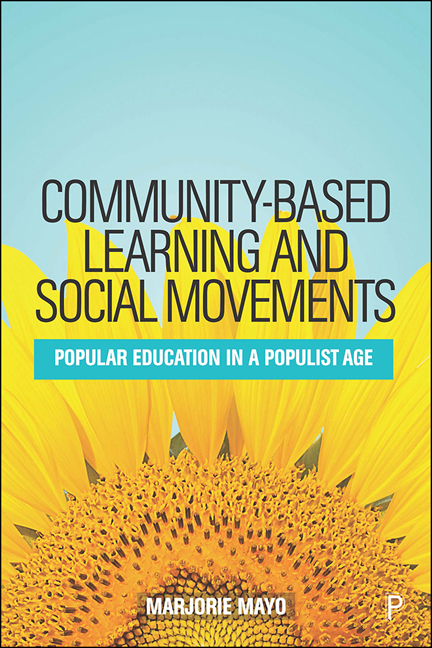Book contents
- Frontmatter
- Dedication
- Contents
- List of Figures
- Acknowledgements
- 1 Popular Education in a Populist Age
- 2 Popular Education and its Roots
- 3 Spaces and Places for Popular Education and Participatory Action Research
- 4 Principles and Practice
- 5 Sharing Understandings of Varying Histories and Cultures
- 6 Making Connections: Linking Issues and Struggles Across Space and Time
- 7 Power and Power Analysis
- 8 Community–University Partnerships
- 9 Taking Emotions into Account
- 10 Looking Backwards, looking Forwards
- References
- Index
6 - Making Connections: Linking Issues and Struggles Across Space and Time
Published online by Cambridge University Press: 10 March 2021
- Frontmatter
- Dedication
- Contents
- List of Figures
- Acknowledgements
- 1 Popular Education in a Populist Age
- 2 Popular Education and its Roots
- 3 Spaces and Places for Popular Education and Participatory Action Research
- 4 Principles and Practice
- 5 Sharing Understandings of Varying Histories and Cultures
- 6 Making Connections: Linking Issues and Struggles Across Space and Time
- 7 Power and Power Analysis
- 8 Community–University Partnerships
- 9 Taking Emotions into Account
- 10 Looking Backwards, looking Forwards
- References
- Index
Summary
The previous chapter focused on the importance of taking account of differences, both differences in terms of people's interests and differences in terms of communities’ organisational cultures and styles. This chapter moves on to focus on the commonalities, the links between people's immediate concerns in different contexts, pursuing the connections between jobs, health and the environment, for example, along with the links between housing and planning, health and wellbeing, and building links across space and time.
With increasing globalisation, local issues are more likely to have wider links as well. Obvious examples include a number of pressing environmental concerns, the toxic fumes that blow across borders for a start. The impact of austerity provides further illustrations of these interconnections, with the loss of local jobs as well as the loss of local services following the international financial crisis of 2007–08.
The first part of this chapter looks back to previous experiences of organising solidarity across international borders through participatory action research, campaigning to address people's health and environmental concerns. This is followed by reflections on experiences of popular education and research over time, linking communities’ varying concerns in the context of industrial decline and planning for urban regeneration. The chapter concludes with more recent experiences, building mutual support systems to connect popular education and participatory action research initiatives in different contexts here in the UK.
Looking back to the Highlander Research and Education Center's approach to making connections
Chapter 2 introduced the Highlander Research and Education Center, in Tennessee, USA, with Myles Horton's conversations with Paulo Freire. As Paulo Freire summarised Highlander's approach, the contents of their learning programmes came from the participants and their issues, as they stood back to reflect on their experiences (Bell et al, 1990: 157). The educators at Highlander ‘have been educators but have accepted to be educated too’ in processes of dialogue, he explained (1990: 156), educators and participants each learning from these processes in turn. This was how the Highlander educators worked, from their first experiences of working with the labour movement from the 1930s through to the 1970s and beyond, starting from what labour movement activists perceived their problems to be.
- Type
- Chapter
- Information
- Community-based Learning and Social MovementsPopular Education in a Populist Age, pp. 95 - 116Publisher: Bristol University PressPrint publication year: 2020



